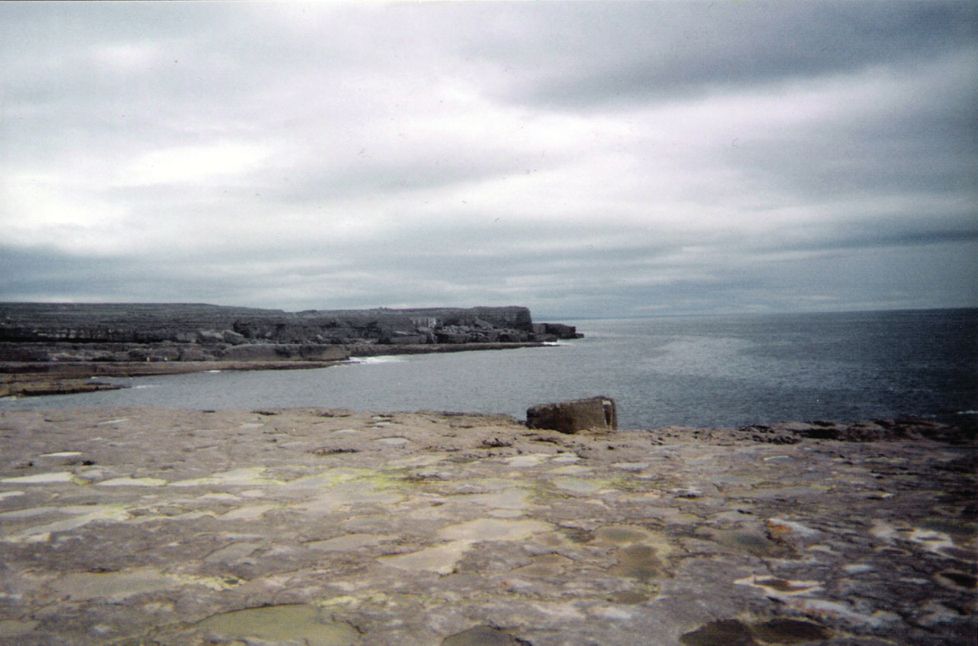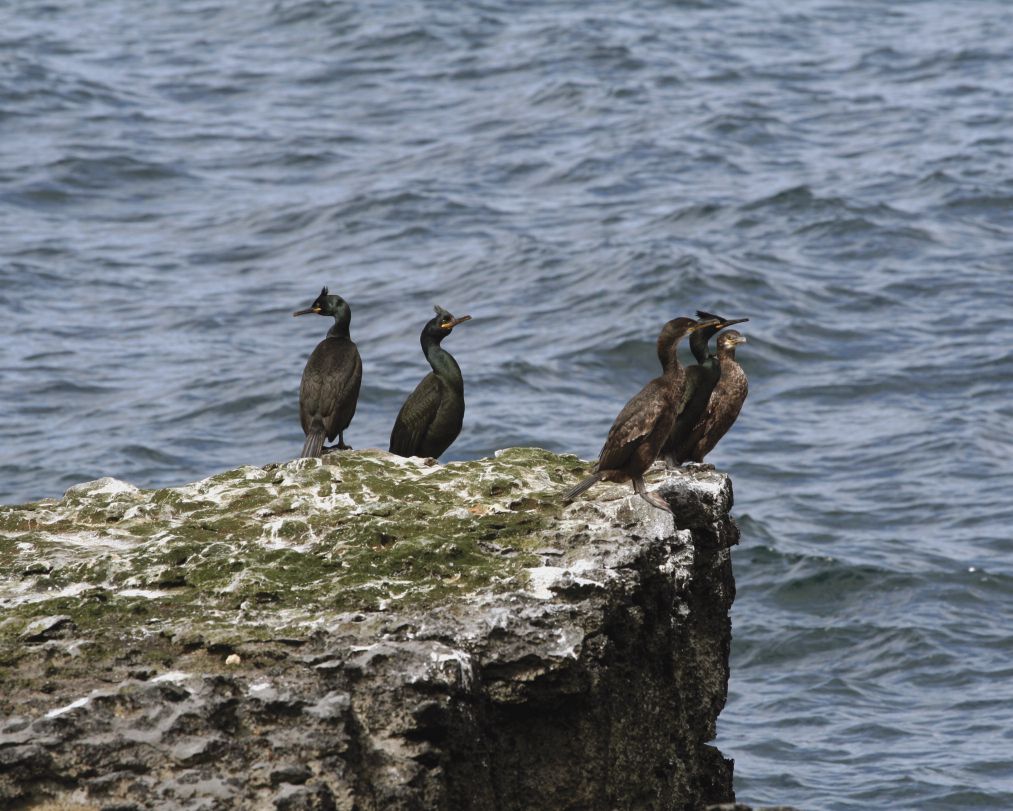
“Give it one week of hard frost,” my new husband says, “and all the green will be gone.” He has slowed the car to let two adolescent does cross the road, and we watch them vanish neatly into the ditch on the other side. In the 4:30 November gloom, the perfect white of their rumps is nearly all we can see.
As they pass through the high brambles of the ditch, Richie admires their fleetness, their nimble feet. I say the deer must risk the danger of the road only because it’s winter and they are hungry, but he says they wouldn’t be wanting yet; that’s when he warns me about the week of frost, and the green.
But here, even in winter, Ireland is so green that to walk through the countryside is almost to think you are underwater. And here a ditch is not a hole, not an absence, but its opposite. An Irish ditch is a raised thicket, a dense living tangle of blackberry and ivy and gorse. Twining through the ditch are innumerable tiny tunnels—through them mice and spiders wind. No snakes here, of course—remember St. Patrick—but the tunnels mimic their absence, their silent, assured sinuousness.
When I first came to this country, I remember thinking that even if I jumped from one of its many cliffs I wouldn’t fall, but float, until the cool wet wind of this place carried me back, softly, onto the grass that is so green it is like water, like every kind of life pulled together into one.
I came here to renew—something, although I didn’t yet know what. And to escape, well, everything.
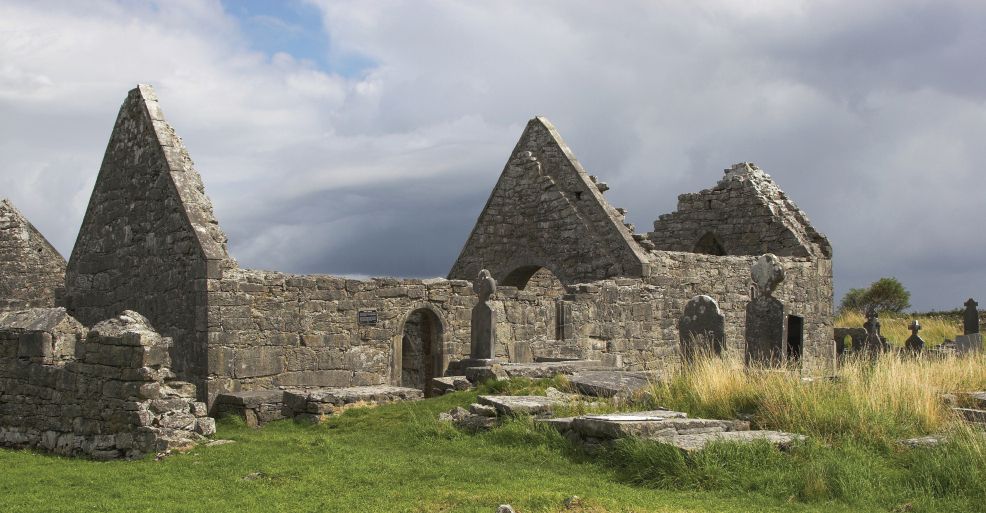
Two years ago, at the end of my MFA program, I was broken down and burned out, spent twigs for a spent fire. I did everything quickly, heart in my mouth, because I felt sure that if I took any extra time I would collapse into ash. I was teaching three times the prescribed student limit, tutoring, writing, finishing my thesis and my classes, and editing my first novel for next year’s publication—all jobs that filled me with whiplash joy and panic and soul-crushing insecurity. A person I loved had shown me such grinding ambivalence that I’d had to let him go, and I spent far too much time imagining our never-to-be future together. There was a cushion-laden corner of the floor in my cheap apartment that was alternately a nook for grading papers and a nest to curl up in and cry until I fell asleep. I ate whatever I thought would make me feel better, mostly cheese and Vernor’s ginger ale. My heart was broken and my belly ached.
I had a particular dream that kept me working: I wanted to go to Ireland. I’d come in second for a Fulbright arts grant to write about selkies in Dublin, and the near miss had left me determined to get there on my own. But when the summer came and I looked at my finances, I realized that even with my book advance I would have to choose between Ireland and more earthly concerns like healthcare and rent.
That day, my father called and said he wanted to know my schedule for next year because he was taking the family to Africa. We would go on safari and sleep in tents together.
But I have spent much of my life figuring out how to avoid being in the same place as my father, especially at night. And for the first time, that day, I told him so. One advantage of being so very tired, on the threshold of adulthood, is that your childhood nightmares start getting tired too, and it is harder for them to frighten you.
“I can’t go,” I said in a voice that shook but was still my own voice, coming out of my own body. “I can’t sleep in the same room with you.”
The other end of the line was silent. After a few seconds he said, “All right. That doesn’t make me happy, but I understand.”
We hung up soon afterward, and one weight was strangely gone from the fears I carried.
A few days later he called again and offered to buy me a ticket to Ireland instead, since I wasn’t going to Africa. It felt like hush money—if I was brave enough to tell him I remembered, whom else might I tell? I said I would have to think about it. I felt sure I would say no, but that dream was a hard one for me to give up.
I went into town to have coffee with Trish, a woman twice my age who feels like someone I grew up with, a friend whom I often call my spiritual guide. The Catholic school we attended, with its Planned Parenthood protests, homophobia, and rape apologism, tempted me to throw up my hands at even a nebulous, agnostic God—but it was Trish’s faith that kept me searching for my own. She combines her devout and somewhat radical Catholicism with dashes of Buddhism and a sharp flair for the intersectionally feminist, and I’ve always loved her for it. I liked to say that she was “Tapped In To Something,” because it was the only way I could find of explaining her radiant wisdom and kindness, the light that shines through her. (When she’s not giving spiritual counsel to frightened young women, Trish is a professor of sociology and a brilliant poet.)
As soon as she sat down I started crying—big, gasping sobs from a shy woman who can rarely even manage to raise her voice in anger. I don’t know if I’d ever shown that much emotion in public before.
Trish stroked my arm. I wept into my giant bowl of latte.
When I quieted, she laughed and said “Honey, I wouldn’t go through my twenties again for anything.”
Suddenly, I felt much better. I wiped my eyes, and she asked me what was wrong.
Trish is third generation Irish-American; three of her grandparents were born on the island where I now live. And it was she, in the end, who brought me here. I told her what my father had offered, how it felt like a bargain I didn’t want to make, and that I never wanted to owe him anything ever again.
She looked at me steadily. “You never will,” she said. “He could give you money until the end of the world and you’d owe him nothing.” He’d taken more, she said, than he could ever give back; and though some well-trained part of me thought I was being a Bad Daughter, I admitted she was right.
“But . . .” said the Bad Daughter, on the verge of tears again. I found I couldn’t finish my sentence, and I took a deep, shaky breath. “God, I’m so tired. I’m sorry about this.” I waved at my eyes.
Trish shook her head. “Go to Ireland,” she said. “You’ll rest there, you’ll write your book. It’s where the world keeps its magic. And don’t go to Dublin. In fact . . .” She pulled out her tablet and did a quick image search. “You need to go here.”
She showed me a Google page thick with pictures of green cliffs, dark waves, and small stone-bound fields. A girl’s feet dangled over the edge of one cliff, her legs mid-swing and relaxed.
“The Aran Islands?” I laughed. “It’s mostly sweaters there, right?”
“The Aran Islands,” she said. “See? You’re happier already. Go there,” she thought for a moment, “for at least a month. It will heal your soul.”
My soul leapt out for healing, and I knew that I would go.
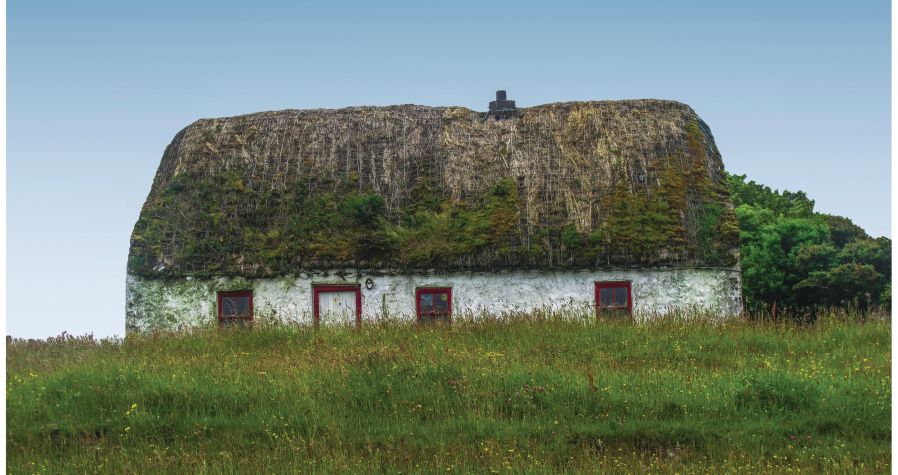
Three months later, I am sitting in the warmest corner of Tigh Joe Watty’s, one of only two pubs on the whole island. I am smiling, and every part of me feels light. Tall, redheaded Uinseon McCarron dances a beautiful Australian girl named Sjonelle across the dark wood floor, and the rest of us at the table watch and admire them, their easy grace and easier smiles. Dave, the handsome, acerbic owner of the hostel where we all work, comes back to the table with pints of cider. I haven’t written anything in weeks.
I did not understand, when I first came to Ireland, why I wasn’t writing. It was the first time in my life that I didn’t feel overworked, and suddenly I couldn’t work at all. I’d been manically, neurotically productive for years, trying to scratch my way into prep school, college, graduate school, New York agencies and publishing houses. And now here I was, not a student for the first time since I was three years old and my parents enrolled me in university preschool. I had my master’s, and my book wasn’t coming out for almost a year. I could support myself until then, meagerly, on my advance and hostel work-exchange.
All my life I had wanted “to write full time,” but here I had all the time in the world, and I wasn’t writing at all. I would wake up early every morning determined to work, and I would hover over the Cinderella retelling on my computer, making small changes that meant nothing. I always ended those sessions at least a little disgusted with myself.
My afternoons, though, I set myself free, wandering through the cobblestoned Latin quarter of Galway City to the rushing gray mouth of the Corrib. I would walk the promenade from Galway to Salthill and back, looking out at the quiet bay, cold wind slipping over my face and silvering my hair and skin with salt, breathing air clean as miracles.
I’ve spent most of my life inside my head. In childhood my body was the site of fear and confusion at the hands of an adult protector; I became expert at curling up inside myself, where my senses would know and remember nothing. The desires and doubts of adolescence only made me retreat further. My body hardly ever did what I wanted it to; I have never even been good at sports.
As I grew older, this disconnect led me to think that my body had no needs of its own, and certainly not much value. It carried my mind and my heart around, and that was all. When I felt worn out at the end of school, I thought it was only my soul that hurt. I didn’t notice the knots in my back.
I struggled over my writing in Ireland, and as Trish had instructed me, I worked to heal my broken heart. It was my lungs and my legs, though, that first grew stronger, walking along the promenade, making beds and mopping floors at the hostel.
Salt and clean air, and enough work to make you need them.
Healing was in my body, was stitching into my very cells, before I could even see it working, before I could see new words on the page. When I came here I thought I was failing, but something was already starting to grow.
In college, I studied literature and fairy tales. Some—”The Selkie Bride,” “Cinderella,” “Red Riding Hood,” “Tam Lin”—I’d read in different translations and retellings since I was a child. I have always loved, more than anything, stories. Stories helped me escape those parts of my childhood that I could talk about only years later. I told myself stories, too, even as I progressed into adulthood. I thought I knew what I wanted, whom I would love, how my life would lead. I was a good student, a follower of rules. Whenever I searched for something, I believed I knew what I would find, and when, and how.
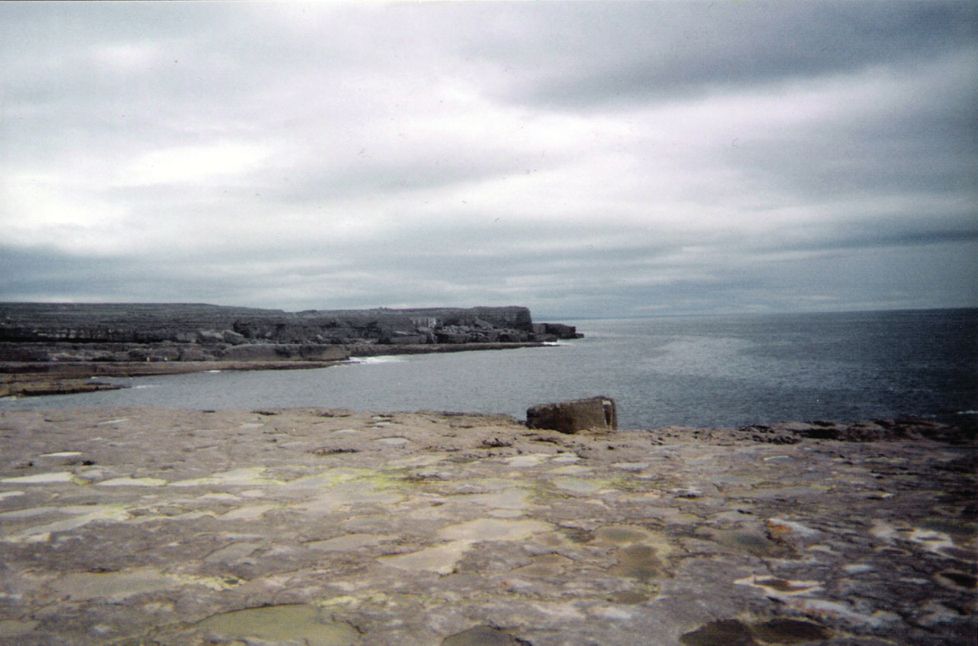
I write fairy tales for a living now, and like many feminist writers I try to give my heroines the agency that they sometimes lack in older versions of the tales. The aims of women of my generation and the one before—and many, many brave and hard-fighting women before us—are all for choice and action. By action I mean achievement, agency, doing. I believe in these ideals; they keep the world moving forward, and help to give it some chance of (maybe, someday) being just.
But lately I have been thinking that these older princesses and witches and peasant girls have a kind of wisdom to offer us that has lately been lost: the wisdom of passivity, of stillness.
Those seemingly un-feminist stillnesses are nearly always there, in the most enduring of the old fairy stories. Snow White, Sleeping Beauty, Red Riding Hood curled up in the wolf: what are they thinking, unthinking, as they lie there un-doing? Are they glad, un-chosen as it is, for the rest?
Whether they are or not, the stillness is part of the narrative, and therefore is itself part of the moving forward, the doing of the story. Even when they are still, their stories go on. And I have found, in the time that I have spent in this place, that stillness has a strength and power of its own. I believe now that I needed not to write for that time. There are many fields here that lie fallow.
Soon after I met my husband on Inis Mor (the largest of the Aran Islands—oh, Trish, how right you were) he told me something that has twined itself through my heart ever since. In Irish, he said “faigheann iarraidh, iarraidh eile.” In English: the search for one thing leads to another.
I came to Ireland to write a book. I could not write, but if the soul is a place of quiet and stillness and peace inside oneself, I found mine, and the island and I healed it where it had been starved and broken. I met my partner, and I found my home. And nine months later, in the spring, living in East Galway with Richie, I began to write again. ♦
From Parabola Volume 39, No. 2 “Embodiment,” Summer 2014. This issue is available to purchase here. If you have enjoyed this piece, consider subscribing.
